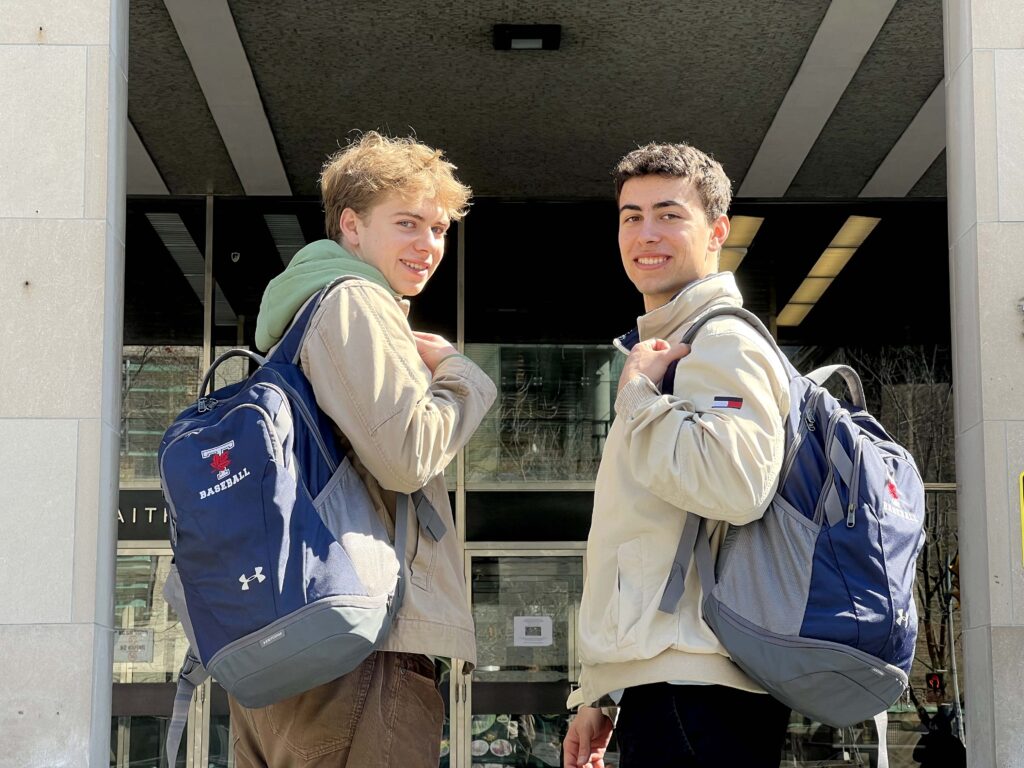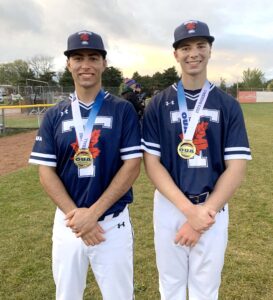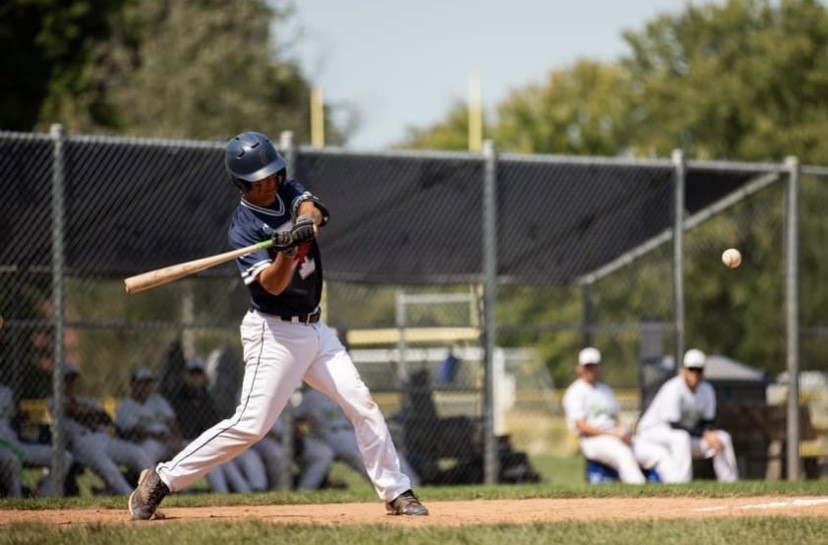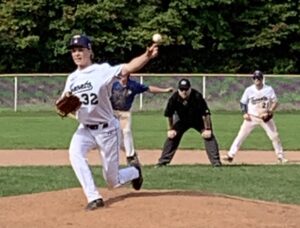Richard and Paul Kosztowniak are teammates on the field, in real life and at Skule™

Brothers Paul Kosztowniak (Year 2 CivE) and Richard Kosztowniak (Year 3 CivE) both play on the Varsity Blues baseball team and are both studying Civil Engineering here at U of T Engineering. Richard is an infielder (#53) and Paul is a pitcher (#32). CivMin had a chat with the Kosztowniaks to see how they’ve balanced pursuing competitive sports, a demanding academic program and more.
Tell us a little about yourselves please.
Paul: We are brothers, from Etobicoke, grew up there, went to high school in Toronto and both of us have a desire to be a civil engineer. We both went into Civil Engineering at U of T. And also have been playing baseball for our whole lives. Luckily, we made the [U of T Varsity baseball] team and we’ve been doing both for a few years now.
What drew you to U of T?
Richard: Some of the things about U of T that appealed to me are it was close to home, so I can stay living at home, but also the fact it is the number one engineering school in Canada. I also like the way they set up the Engineering program with things like the PEY Co-op opportunity, which was very appealing to me. That, combined with it being ranked as the number one engineering school in Canada – one of the top in the world, was what made me decide to come here.
And, in particular, civil?
Paul: Civil engineering is just something that’s always been a little bit more interesting to me. Even before being in university, we both played with Lego a lot because it’s something that’s interesting to us. I really pay attention to infrastructure while on road trips, because I’m actually interested in how transportation systems are set up. I love riding the subway – I always look at the train tracks as we go by – that’s something I’ve always done since I was young. And we have a little bit of a family background in civil engineering, so that kind of probably inspired us as well.
Tell us about this family background in civil engineering.
Richard: We have a few relatives who work in the engineering field, specifically civil. We have an uncle who works as a civil and architectural engineer in Michigan – he’s a partner at his company. He showed us a lot of projects he’s worked on over the years and tells us about his experiences, and his trips to work on projects in different parts of the world.
It’s always interested me and my brother too. Every time we go somewhere, I like to look at the buildings, different architecture involved and I think that each city has different kinds of architectural features to see out there. My family went to Poland last year and one of my favourite parts about the trip was looking at different, older architecture on the buildings. It was really interesting to see how they do it there; it’s done differently in different parts of the world. And I think there’s a lot of interesting stuff that can be done in civil engineering, which is why I personally went into the field.
You said you played baseball, both of you, for most of your life lives and you grew up in the Toronto area, so you played in the area too?
Paul: We’re from Etobicoke, so I guess there’s some inspiration having one of the greatest current baseball players also from there. It kind of just played out that we play on the same rec team that he did when he was about our age, just a few years ago. That player is Joey Votto.
Playing baseball is just something that we started when we were young. We always enjoyed watching the Blue Jays play on TV. We figured if we were to get into a sport, that would probably be what’s most suitable for us. We’ve always enjoyed as long as we played, so we definitely never wanted to stop and we wanted to just keep going further with it.
Richard: And as for U of T baseball, when both me and my brother joined the school, we heard about the team and heard they’re a pretty good and pretty serious, relative to other teams in Ontario. It seemed like a really good opportunity to be able to keep playing at a high level while we’re studying our school. Baseball at U of T was definitely something that was appealing to me.
You both started as Varsity Blues athletes at the same time?
Paul: Yeah, we both tried out the same year, the same trial session. I’m in my second year for U of T baseball; in first year I started my first year of playing.
Richard: Yeah. We both walked on at the same time.
Paul: It’s been a lot of fun and a great experience. It worked out really well for us.

And how did how did the season go?
Paul: I mean, basically, very, very well. We won the OUA [Ontario University Athletics] Championship!
Richard: It was a great season – really fun. And it’s easy with our civil engineering curriculum too, because it’s condensed all into the month of September and half of October. So that’s when it’s pretty heavy with our scheduled games.
All of our games would be on the weekends – some exhibition during the week with practices during the week. But after that, we have a nice little break until the Christmas New Year’s break and then practices for the next season starting in January going to the beginning April. So it’s manageable and I feel like it’s a nice, manageable balance but also still competitive.
You alluded to how busy it is in the fall. You have workouts, practices, and then games. How many events each week? How do you find the time?
Paul: It’s busy. It’s probably four events on a weekend, two practices during weekdays and then some expectations to do lifts [at the gym] and stay in shape. But I really like the way the coaches, particularly head coach Andrew Needles, set up in their general attitude towards academics. They’re very understanding that this is a very academic school. They provide incentive to really achieve great things with baseball, and to really push ourselves there, but to not have it so that it conflicts with our schoolwork. So, we can still juggle both and do well.
Richard: I think it’s also the way that our coaches make it is it’s a very good experience in the sense that it doesn’t affect our school in a negative way when it could, it definitely could, right having such an intense sports program for that month and a half with so many games and being an engineering it can be pretty challenging, but our coaches allow it to be pretty doable. And then I’ve been doing it for two years. So as Paul and I think that just the fact that they understand that if you have to miss a practice, you know, if you have to miss like a team lift, it’s okay and they still expect you to you know, put in the work and try really hard but they understand that there are two sides of the story. And because of that, I would say I’ve been able to do it.
Richard, you’re completing third year now. Are you going to do a Professional Experience Year Co-op [PEY Co-op]?
Richard: I’m doing PEY Co-op this coming year. I’m hoping I’ll still be able to play on the baseball team too. My job is in Mississauga, at an infrastructure company, so I think it’s possible. My position will be pricing and estimating. That’s cool.
Paul, I’m gathering since you have a love of transportation, when it’s time for PEY Coop you might be looking for something in that area, right?
Paul: Yes, I’m hoping to find something like that. I’m definitely leaning towards transportation. I want to at least test the waters and see make sure it really is what I’m most interested in.
How about academically? Are there any classes that have stood out to you, or professors you really thought were a outstanding?
Richard: Yes, in my third year I found it a lot more interesting than first and second year, because we start to actually have courses that are specific to the types of civil engineering we can do. For example, there’s municipal, there’s transportation, there’s geotechnical engineering, there’s all those classes. And it’s great to be able to get a very specific learning experience for each one, so that I know it helps me choose which pathway I want to go into, and it helps me maybe rule some. Personally, I’ve been really interested with municipal engineering and also structural courses. We’ve done some design courses like steel and timber that have really interested me and even a second year of structural analysis. It’s helped me to be able to zone in what I wanted to go into.
Richard: I really liked my CIV340 Municipal Engineering instructor Florence Udenby [PhD candidate]. She makes it really interesting learning about how the how pipes and everything make up a city sewage system. And I’ve also really liked I really liked Professor [Jeffrey] Siegel. He taught my CIV375 Building Science course last semester and CIV380 Sustainable Energy systems this semester, and really makes it interesting. He exposes the different options that are out there for such methods of creating and storing energy and that also really interested me in building science. Those are some good memories I have of some classes.
Paul: I’m only a second year, so a lot of my courses haven’t gotten too specific in terms of civil engineering yet. It’s more theory and concepts at the moment. But some of my favourites make me feel reassured I’ve made the right choice with civil engineering. One is my CIV214 Structural Analysis course this year – I really like my professor. I really like the way he teaches a course
I really enjoyed what Antoine Pepin [PhD candidate] did for the CME210 Solid Mechanics course in first semester. I really enjoyed Professor [Jeffrey] Packer in CIV100 Mechanics. So, all of those being some of my favorites is really reassuring, because those are all very specific to civil engineering. Now I know I made a good choice with that.
Richard: It reminds me of first year I had some good experiences with Professor Packer, for Mechanics, as well as well as Professor Shai Cohen in my first year math. Both of those really stood out to me as my best learning experiences in first year.

Richard, you went to Camp [for CME358 – Civil An Mineral Practicals / CAMP] this past summer. What was that like?
Richard: The Camp experience was really good. I went for the full two weeks in beginning of August. There’s two different sessions – you can go beginning of August to mid August, or mid August to end of August or early September.
It’s a really fun experience. You get to stay overnight there for two weeks and it’s right on a lake [Gull Lake by Minden, Ont.]. During the day, there’s three different stations, which you get rotated through every four days. One would be a mapping theme station where you learn how to use total stations, and measure different elevations, then at the end of those four days make a giant elevation map.
The second station was testing the water in the lake for eutrophication and you find out if there is eutrophication in the lake, then make a little presentation to your classmates and the teaching assistants.
Then the third station was working on the design of a highway curve. There was a patch of grass cut in the area surrounding the camp, and you would use total stations there again, find the elevations, do some math and then present on a piece of paper the potential curve that can be built for a highway in that space.
All those three different areas were really interesting to learn, because it’s beginning to apply stuff you learn in class to actual real world things that an engineer would do. It was a great experience in that regard. And it was a nice overall experience as well. Because after the day, when we’re done our work, we’d have free time in the evenings when we can go swimming, go canoeing, we can talk to our friends, or go build a campfire. There’s a lot of different things we could do. The food there was really great too!
So, overall, is a pretty good experience where it challenged you to learn new things, while working as a team in the field on projects, but also give you some relaxation time as a reward.
On campus, do you guys have the same, or perhaps different, go-to places if you have downtime, or to study?
Paul: I pretty much have my two favourite places I like to get work done and spend during downtime. The first one is a place I feel like isn’t too popular, so I really like it. It’s my little domain in the basement of Myhal, where they have an ECF [Engineering Computing Facility] lab down there, which is usually used for a Python course or when they do Math Lab in first year. It’s usually pretty quiet and we can get work done. If not there then usually Robarts, being our biggest library. I like to go there as well.
Richard: Personally, I’m more of a library guy, so I’ll go to Robarts or Gerstein Library. Robarts is pretty nice because there’s different floors, and so many different rooms, so you don’t get bored of going to the same place every time. There’s areas where there’s more people, so if you need you can stay with your friends and there’s quiet spaces where, if you’re by yourself, you can get some quiet studying done.

Do you have any special places, or a go-to spot, for a snack, lunch or a meal?
Paul: Definitely in terms of food, the first thing that comes to my mind is the food trucks outside of Bahen. I’m a big fan of what’s now the white truck – I don’t know the exact name.
For social, that’s when I would choose to study at Robarts, because just the amount of foot traffic and the amount of people there and like if you choose one of the busier rooms, you’re bound to run into somebody you know.
I also tend to have some of my social time at the gym – I try to organize this so I can go with friends. And I try to split going to the Athletic Centre or Goldring [Centre for High Performance Sport], depending on what my goal is for that day, because some specialize in different kinds of equipment.
Richard: For me, I’m social and food wise it’s kind of actually the same. Recently I’ve been going with my friends a lot to Sydney Smith because they have a cafeteria in the basement where you can order some food. You can also get hotdogs at the cart right outside Sidney Smith. Or you can bring your own lunch. Either way, there’s a lot of tables there where you can eat and that’s pretty nice experience. I’d say the gym as well – I go for social reasons. I got to the Goldring Centre more often, but I also do go to the Athletic Centre.
Is there any special talent you have or something interesting you might tell us about?
Paul: I will say I really, really like bowling. Near where I live there’s a bowling alley close to our house and it opens at 10a.m. So, if there’s a time when I don’t really have to come into school or when there’s no tutorials, sometimes I’ll try to go there early in the morning. Or also during my reading break or Christmas break or between semesters.
I can go multiple times a week myself alone, but it’s usually with friends. It’s not really a big social gathering. Sometimes I’ll go with Richard or it will be with one or two other friends. And, yeah, that’s pretty much my biggest hobby outside of school and baseball.
Richard: I guess it’d be actually kind of similar to Paul, but for me it’d be spikeball in the summertime. I love playing spikeball with my friends. We’ll go to a park or something like that. If you’re wondering what spikeball is, I can explain. It’s kind of like volleyball but a little bit different. There’s a circular net that’s on the ground and you have a small kind of bouncy inflatable ball, and basically work with a partner so you can hit it to each other. There’s a certain amount of times that you can touch it and then you can hit it down on the net and have that bounce over to the other side. They have to keep going back and forth and hit it back to you. It’s basically the first one to let it hit the ground that loses.
In closing, is there anything looking back on you’d give advice to somebody coming in to first year? Anything you’d say you should get involved with or any tips?
Paul: I would say don’t be afraid to join a team or club, because I know I was afraid coming in the first year. Lots of people told me how intensive the workload could be in Engineering, and I was worried that maybe it would be too much for me to handle. But, at the end of the day, I chose to join the baseball team in my first year. And I never regretted it for a second because, just as we mentioned earlier, the the coaches are very understanding. They set their expectations so it allows you to easily excel in both baseball and in your schoolwork. So being on the baseball team only gave me more opportunities. Obviously, in your first year you want to branch out to make new friends and things like that. It really only enriched my academic life and it definitely didn’t take anything away from it. I would definitely say don’t be afraid to join a team.
Richard: For me, I would say there’s a lot of resources out there in Engineering to help us do better in our courses. For example, you can go to office hours and talk to the professors. A lot of resources online just courses and Skule.ca, where you can go and find past midterms and exams. All that kind of stuff helps with studying for me when I started in first year. I didn’t know about any of that stuff, so I was kind of struggling when it comes to studying and keeping up with the material.
But then, as I spend more semesters in the program, I find out that there’s actually a lot of different things you can do. You can even use textbooks you can go to go to talk with your friends to study with your friends. There’s a lot of different ways out there to you can keep up to date with your course material. And in doing that it kind of helped me be able to balance a school and sport lifestyle because I was able to keep up with school. I found out about the resources that were available to me and it kind of helped me stay afloat and do well on my programs while also doing sports.
By Phill Snel